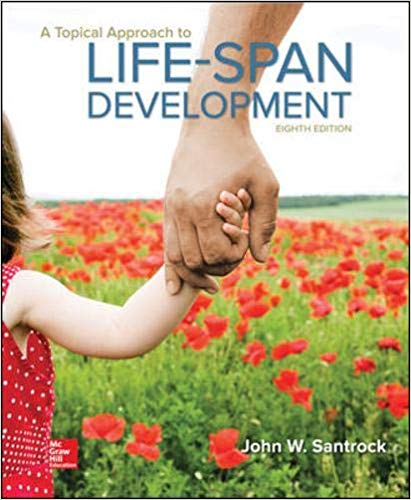Test Bank For A Topical Approach to Lifespan Development 8th Edition By Santrock
Digital item No Waiting Time Instant DownloadISBN-10:9780077861995 ISBN-13:978-0077861995
In Stock
Original price was: $55.00.$35.00Current price is: $35.00.
Test Bank For A Topical Approach to Lifespan Development 8th Edition By Santrock
Chapter 03 – Physical Development and Biological Aging
Multiple Choice Questions
1. According to the cephalocaudal growth pattern, which of the following is likely to show fast growth first?A. legsB. handsC. brainD. stomach
Page: 83 APA Outcome: 1.2Bloom’s Taxonomy: UnderstandDifficulty Level: BasicLearning Objective: Discuss major changes in the body through the life span.Topic: Patterns of Growth
2. According to the proximodistal growth pattern, which of the following is likely to show growth earlier?A. toesB. fingersC. feet and handsD. legs and arms
Page: 83 APA Outcome: 1.2Bloom’s Taxonomy: UnderstandDifficulty Level: BasicLearning Objective: Discuss major changes in the body through the life span.Topic: Patterns of Growth
3. Which of the following indicates that growth progresses from the top of the body to the bottom?A. cephalocaudalB. proximodistalC. sarcopeniaD. lateralization
Page: 83 APA Outcome: 1.2Bloom’s Taxonomy: RememberDifficulty Level: BasicLearning Objective: Discuss major changes in the body through the life span.Topic: Patterns of Growth
4. In prenatal development, the head and its features grow in size and differentiation before the neck, shoulders, trunk, and limbs. What is this pattern of development called?A. proximodistalB. cephalocaudalC. sarcopeniaD. lateralization
Page: 83 APA Outcome: 1.2Bloom’s Taxonomy: RememberDifficulty Level: BasicLearning Objective: Discuss major changes in the body through the life span.Topic: InfancyTopic: Patterns of Growth
5. Which growth pattern sequence indicates that growth progresses from the center of the body toward the extremities?A. cephalocaudalB. proximodistalC. sarcopeniaD. lateralization
Page: 83 APA Outcome: 1.2Bloom’s Taxonomy: RememberDifficulty Level: BasicLearning Objective: Discuss major changes in the body through the life span.Topic: Patterns of Growth
6. Baby Kassie can slap the tray of the highchair but cannot pick up small pieces of cereal with her fingers yet. This is an example ofA. a neurological disorder.B. the cephalocaudal pattern in physical growth.C. a congenital birth defect.D. the proximodistal pattern in physical growth.
Page: 83 APA Outcome: 1.2APA Outcome: 1.3Bloom’s Taxonomy: ApplyDifficulty Level: ModerateLearning Objective: Discuss major changes in the body through the life span.Topic: InfancyTopic: Patterns of Growth
7. Sammi was born 3 days ago and has lost 3 percent of her body weight. Should her parents be concerned?A. Yes. Sammi’s parents should consult her pediatrician immediately.B. No. Babies normally lose between 5 and 7 percent of their body weight within the first few days after birth.C. No. Babies normally lose between 9 and 12 percent of their body weight within the first few days after birth.D. Maybe. Sammi’s parents should begin supplementing breast-feeding with baby formula and weigh her twice a day to ensure no more weight is lost.
Page: 84 APA Outcome: 1.2APA Outcome: 1.3Bloom’s Taxonomy: ApplyDifficulty Level: ModerateLearning Objective: Discuss major changes in the body through the life span.Topic: InfancyTopic: Weight
8. Average North American babies double their birth weight by what age?A. 1 monthB. 4 monthsC. 8 monthsD. 10 months
Page: 84 APA Outcome: 1.2Bloom’s Taxonomy: RememberDifficulty Level: BasicLearning Objective: Discuss major changes in the body through the life span.Topic: InfancyTopic: Weight
9. Marcia’s baby boy weighed 8 pounds at birth. How much should he weigh by 4 months of age?A. 10 poundsB. 12 poundsC. 16 poundsD. 24 pounds
Page: 84 APA Outcome: 1.2APA Outcome: 1.3Bloom’s Taxonomy: ApplyDifficulty Level: ModerateLearning Objective: Discuss major changes in the body through the life span.Topic: InfancyTopic: Weight
10. During the second year of life, a child’s growth rateA. remains the same as the growth rate in the first year of life.B. accelerates considerably.C. slows considerably.D. accelerates for physical characteristics and slows for mental processes.
Page: 84 APA Outcome: 1.2Bloom’s Taxonomy: RememberDifficulty Level: BasicLearning Objective: Discuss major changes in the body through the life span.Topic: InfancyTopic: Weight


Reviews
There are no reviews yet.